Clinical Ethics Case Study: Hormone Therapy for Minors in New Zealand
VerifiedAdded on 2023/06/10
|8
|2220
|381
Case Study
AI Summary
This case study analyzes the ethical and legal considerations surrounding hormone replacement therapy for a 14-year-old identifying as male, focusing on a scenario where the patient desires testosterone therapy but the mother opposes it. The analysis explores relevant ethical concepts such as autonomy and beneficence, professional codes of conduct including duty of care and social responsibility, and legal aspects under New Zealand's Ministry of Health guidelines. It discusses the importance of informed consent, the role of healthcare professionals in balancing patient needs with potential harm, and the justified decision-making process in such complex cases. The study emphasizes the need for thorough evaluation by psychologists and endocrinologists, adherence to legal frameworks, and prioritization of the patient's overall well-being, highlighting the complexities of navigating hormone therapy for minors and the critical balance between ethical principles and legal obligations. Desklib provides this case study along with other solved assignments.
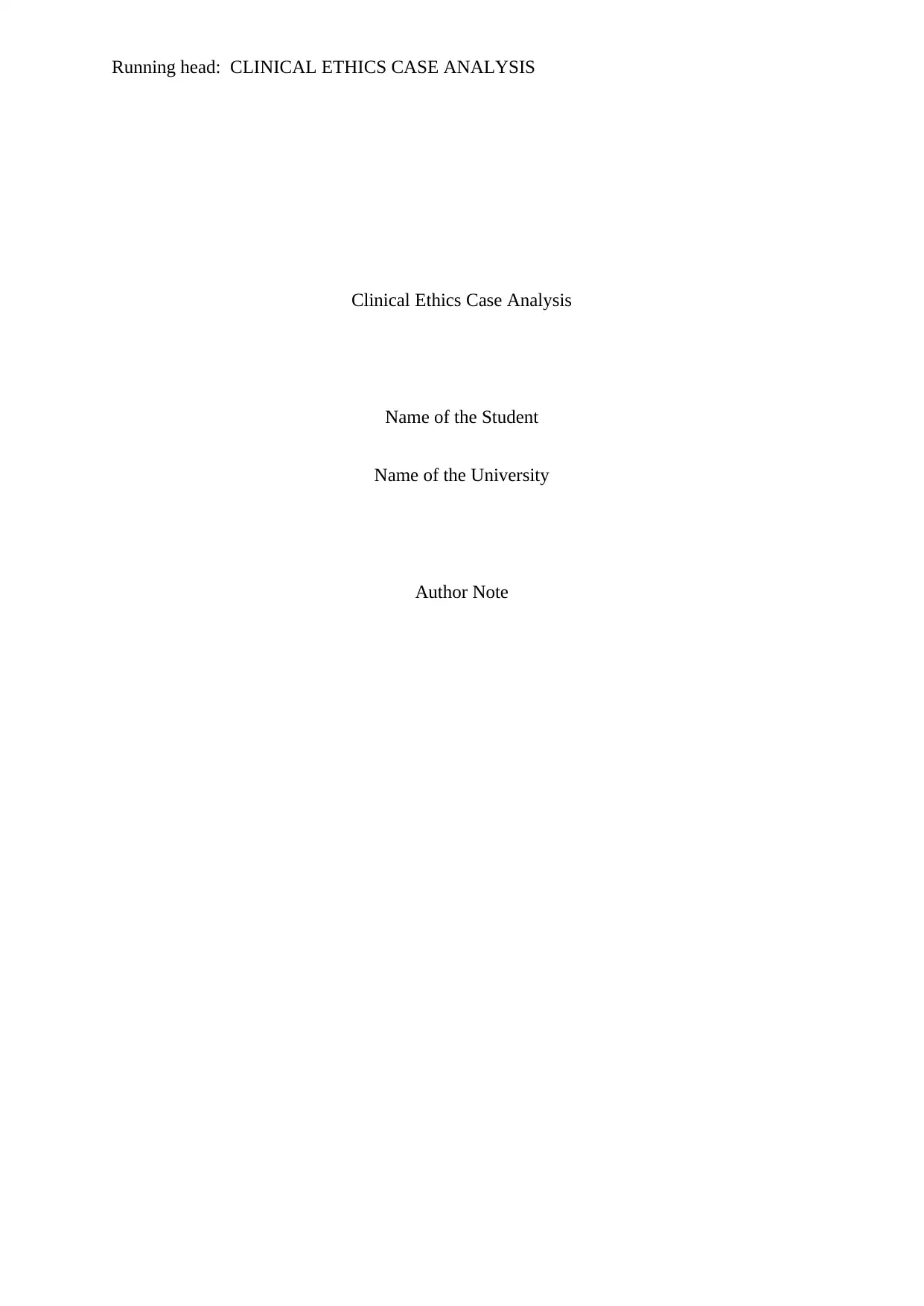
Running head: CLINICAL ETHICS CASE ANALYSIS
Clinical Ethics Case Analysis
Name of the Student
Name of the University
Author Note
Clinical Ethics Case Analysis
Name of the Student
Name of the University
Author Note
Paraphrase This Document
Need a fresh take? Get an instant paraphrase of this document with our AI Paraphraser
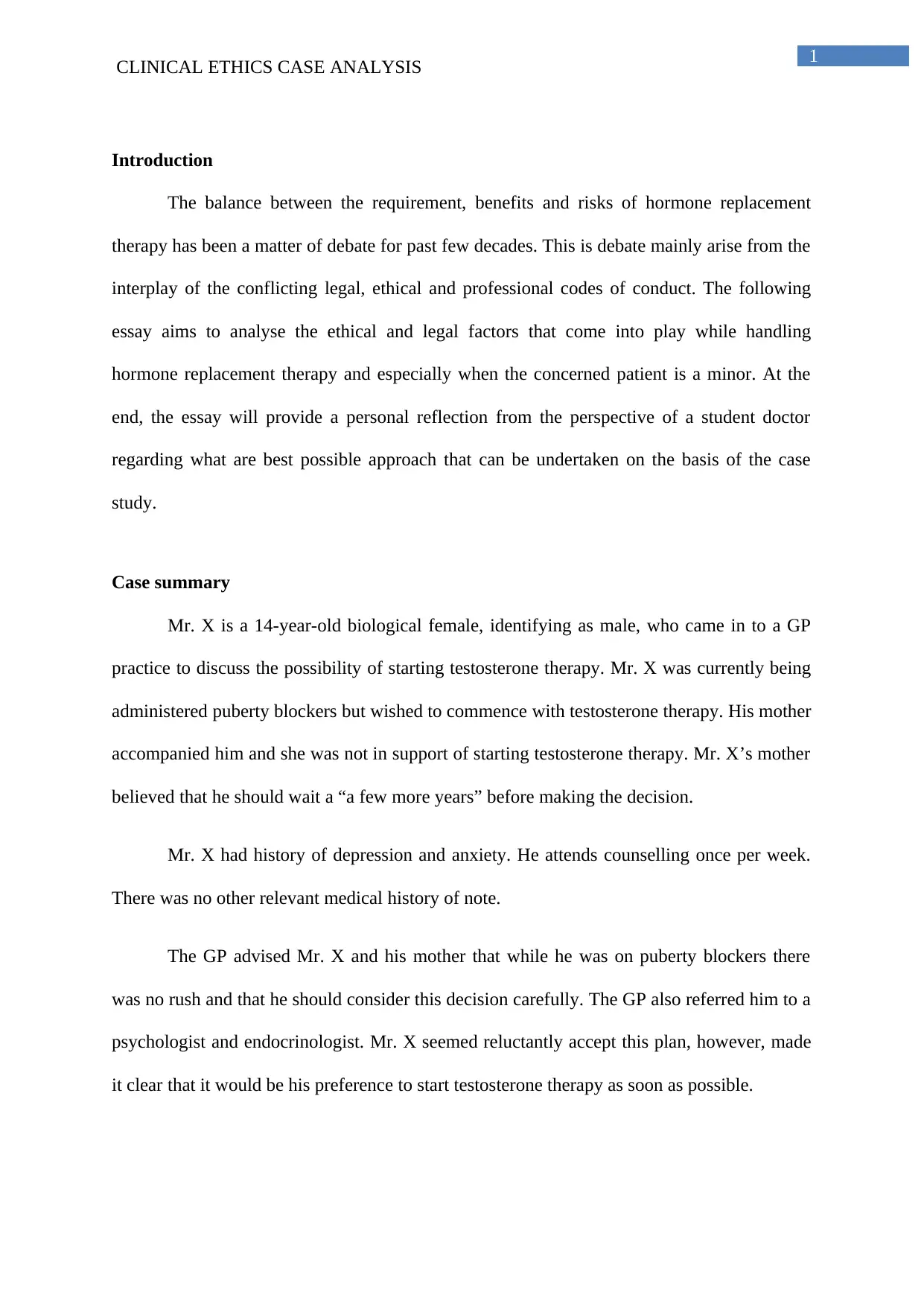
1
CLINICAL ETHICS CASE ANALYSIS
Introduction
The balance between the requirement, benefits and risks of hormone replacement
therapy has been a matter of debate for past few decades. This is debate mainly arise from the
interplay of the conflicting legal, ethical and professional codes of conduct. The following
essay aims to analyse the ethical and legal factors that come into play while handling
hormone replacement therapy and especially when the concerned patient is a minor. At the
end, the essay will provide a personal reflection from the perspective of a student doctor
regarding what are best possible approach that can be undertaken on the basis of the case
study.
Case summary
Mr. X is a 14-year-old biological female, identifying as male, who came in to a GP
practice to discuss the possibility of starting testosterone therapy. Mr. X was currently being
administered puberty blockers but wished to commence with testosterone therapy. His mother
accompanied him and she was not in support of starting testosterone therapy. Mr. X’s mother
believed that he should wait a “a few more years” before making the decision.
Mr. X had history of depression and anxiety. He attends counselling once per week.
There was no other relevant medical history of note.
The GP advised Mr. X and his mother that while he was on puberty blockers there
was no rush and that he should consider this decision carefully. The GP also referred him to a
psychologist and endocrinologist. Mr. X seemed reluctantly accept this plan, however, made
it clear that it would be his preference to start testosterone therapy as soon as possible.
CLINICAL ETHICS CASE ANALYSIS
Introduction
The balance between the requirement, benefits and risks of hormone replacement
therapy has been a matter of debate for past few decades. This is debate mainly arise from the
interplay of the conflicting legal, ethical and professional codes of conduct. The following
essay aims to analyse the ethical and legal factors that come into play while handling
hormone replacement therapy and especially when the concerned patient is a minor. At the
end, the essay will provide a personal reflection from the perspective of a student doctor
regarding what are best possible approach that can be undertaken on the basis of the case
study.
Case summary
Mr. X is a 14-year-old biological female, identifying as male, who came in to a GP
practice to discuss the possibility of starting testosterone therapy. Mr. X was currently being
administered puberty blockers but wished to commence with testosterone therapy. His mother
accompanied him and she was not in support of starting testosterone therapy. Mr. X’s mother
believed that he should wait a “a few more years” before making the decision.
Mr. X had history of depression and anxiety. He attends counselling once per week.
There was no other relevant medical history of note.
The GP advised Mr. X and his mother that while he was on puberty blockers there
was no rush and that he should consider this decision carefully. The GP also referred him to a
psychologist and endocrinologist. Mr. X seemed reluctantly accept this plan, however, made
it clear that it would be his preference to start testosterone therapy as soon as possible.
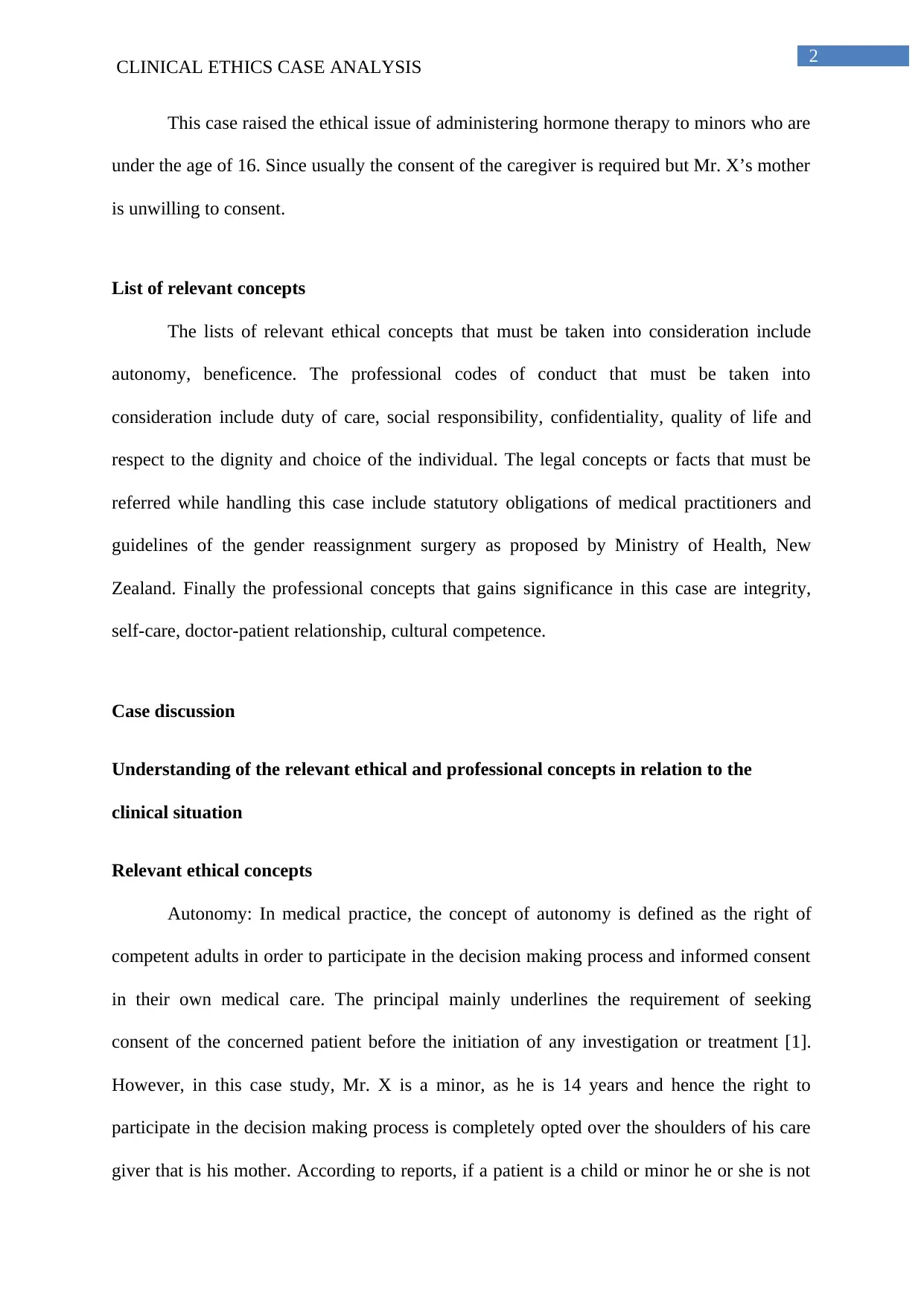
2
CLINICAL ETHICS CASE ANALYSIS
This case raised the ethical issue of administering hormone therapy to minors who are
under the age of 16. Since usually the consent of the caregiver is required but Mr. X’s mother
is unwilling to consent.
List of relevant concepts
The lists of relevant ethical concepts that must be taken into consideration include
autonomy, beneficence. The professional codes of conduct that must be taken into
consideration include duty of care, social responsibility, confidentiality, quality of life and
respect to the dignity and choice of the individual. The legal concepts or facts that must be
referred while handling this case include statutory obligations of medical practitioners and
guidelines of the gender reassignment surgery as proposed by Ministry of Health, New
Zealand. Finally the professional concepts that gains significance in this case are integrity,
self-care, doctor-patient relationship, cultural competence.
Case discussion
Understanding of the relevant ethical and professional concepts in relation to the
clinical situation
Relevant ethical concepts
Autonomy: In medical practice, the concept of autonomy is defined as the right of
competent adults in order to participate in the decision making process and informed consent
in their own medical care. The principal mainly underlines the requirement of seeking
consent of the concerned patient before the initiation of any investigation or treatment [1].
However, in this case study, Mr. X is a minor, as he is 14 years and hence the right to
participate in the decision making process is completely opted over the shoulders of his care
giver that is his mother. According to reports, if a patient is a child or minor he or she is not
CLINICAL ETHICS CASE ANALYSIS
This case raised the ethical issue of administering hormone therapy to minors who are
under the age of 16. Since usually the consent of the caregiver is required but Mr. X’s mother
is unwilling to consent.
List of relevant concepts
The lists of relevant ethical concepts that must be taken into consideration include
autonomy, beneficence. The professional codes of conduct that must be taken into
consideration include duty of care, social responsibility, confidentiality, quality of life and
respect to the dignity and choice of the individual. The legal concepts or facts that must be
referred while handling this case include statutory obligations of medical practitioners and
guidelines of the gender reassignment surgery as proposed by Ministry of Health, New
Zealand. Finally the professional concepts that gains significance in this case are integrity,
self-care, doctor-patient relationship, cultural competence.
Case discussion
Understanding of the relevant ethical and professional concepts in relation to the
clinical situation
Relevant ethical concepts
Autonomy: In medical practice, the concept of autonomy is defined as the right of
competent adults in order to participate in the decision making process and informed consent
in their own medical care. The principal mainly underlines the requirement of seeking
consent of the concerned patient before the initiation of any investigation or treatment [1].
However, in this case study, Mr. X is a minor, as he is 14 years and hence the right to
participate in the decision making process is completely opted over the shoulders of his care
giver that is his mother. According to reports, if a patient is a child or minor he or she is not
⊘ This is a preview!⊘
Do you want full access?
Subscribe today to unlock all pages.

Trusted by 1+ million students worldwide
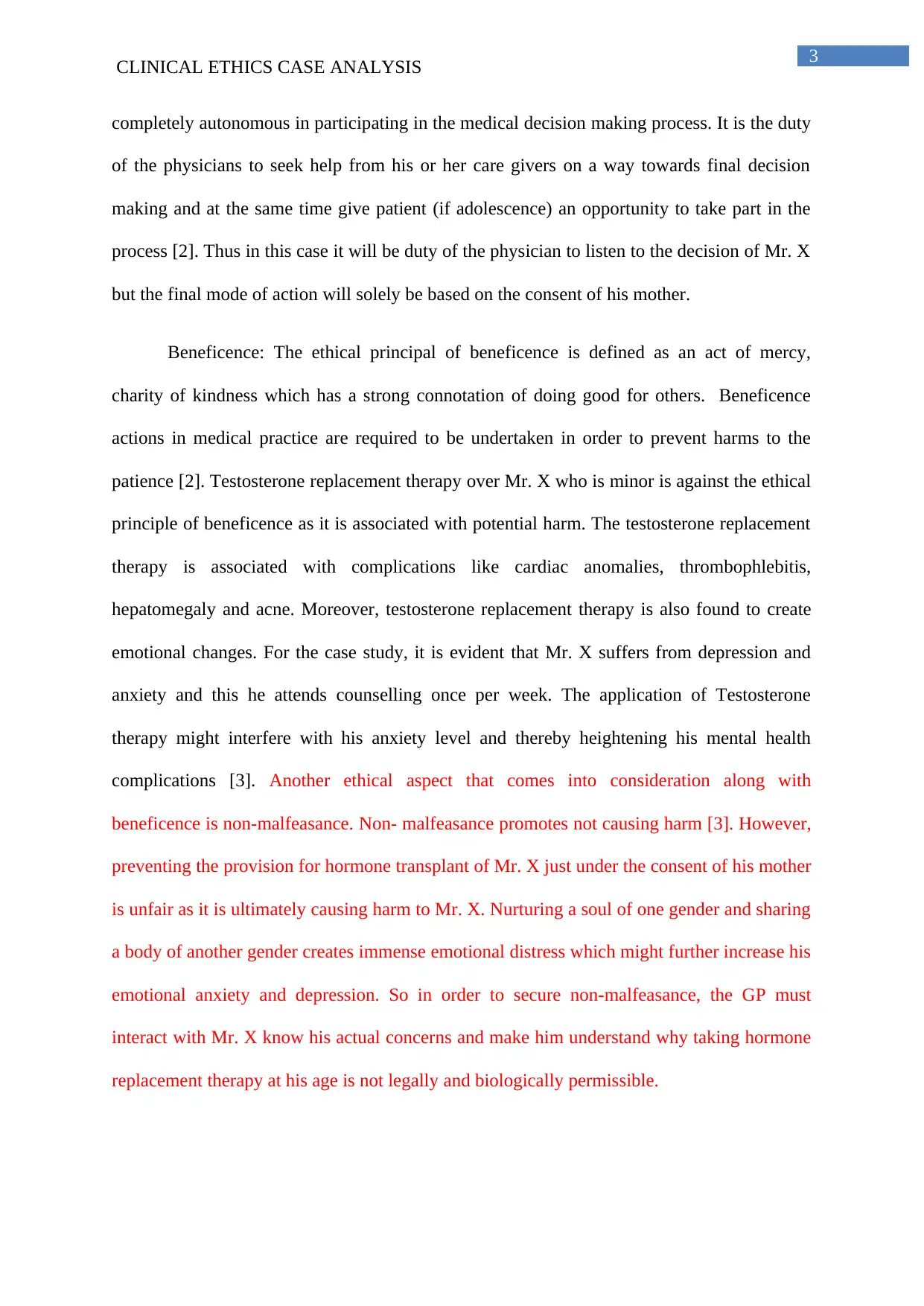
3
CLINICAL ETHICS CASE ANALYSIS
completely autonomous in participating in the medical decision making process. It is the duty
of the physicians to seek help from his or her care givers on a way towards final decision
making and at the same time give patient (if adolescence) an opportunity to take part in the
process [2]. Thus in this case it will be duty of the physician to listen to the decision of Mr. X
but the final mode of action will solely be based on the consent of his mother.
Beneficence: The ethical principal of beneficence is defined as an act of mercy,
charity of kindness which has a strong connotation of doing good for others. Beneficence
actions in medical practice are required to be undertaken in order to prevent harms to the
patience [2]. Testosterone replacement therapy over Mr. X who is minor is against the ethical
principle of beneficence as it is associated with potential harm. The testosterone replacement
therapy is associated with complications like cardiac anomalies, thrombophlebitis,
hepatomegaly and acne. Moreover, testosterone replacement therapy is also found to create
emotional changes. For the case study, it is evident that Mr. X suffers from depression and
anxiety and this he attends counselling once per week. The application of Testosterone
therapy might interfere with his anxiety level and thereby heightening his mental health
complications [3]. Another ethical aspect that comes into consideration along with
beneficence is non-malfeasance. Non- malfeasance promotes not causing harm [3]. However,
preventing the provision for hormone transplant of Mr. X just under the consent of his mother
is unfair as it is ultimately causing harm to Mr. X. Nurturing a soul of one gender and sharing
a body of another gender creates immense emotional distress which might further increase his
emotional anxiety and depression. So in order to secure non-malfeasance, the GP must
interact with Mr. X know his actual concerns and make him understand why taking hormone
replacement therapy at his age is not legally and biologically permissible.
CLINICAL ETHICS CASE ANALYSIS
completely autonomous in participating in the medical decision making process. It is the duty
of the physicians to seek help from his or her care givers on a way towards final decision
making and at the same time give patient (if adolescence) an opportunity to take part in the
process [2]. Thus in this case it will be duty of the physician to listen to the decision of Mr. X
but the final mode of action will solely be based on the consent of his mother.
Beneficence: The ethical principal of beneficence is defined as an act of mercy,
charity of kindness which has a strong connotation of doing good for others. Beneficence
actions in medical practice are required to be undertaken in order to prevent harms to the
patience [2]. Testosterone replacement therapy over Mr. X who is minor is against the ethical
principle of beneficence as it is associated with potential harm. The testosterone replacement
therapy is associated with complications like cardiac anomalies, thrombophlebitis,
hepatomegaly and acne. Moreover, testosterone replacement therapy is also found to create
emotional changes. For the case study, it is evident that Mr. X suffers from depression and
anxiety and this he attends counselling once per week. The application of Testosterone
therapy might interfere with his anxiety level and thereby heightening his mental health
complications [3]. Another ethical aspect that comes into consideration along with
beneficence is non-malfeasance. Non- malfeasance promotes not causing harm [3]. However,
preventing the provision for hormone transplant of Mr. X just under the consent of his mother
is unfair as it is ultimately causing harm to Mr. X. Nurturing a soul of one gender and sharing
a body of another gender creates immense emotional distress which might further increase his
emotional anxiety and depression. So in order to secure non-malfeasance, the GP must
interact with Mr. X know his actual concerns and make him understand why taking hormone
replacement therapy at his age is not legally and biologically permissible.
Paraphrase This Document
Need a fresh take? Get an instant paraphrase of this document with our AI Paraphraser
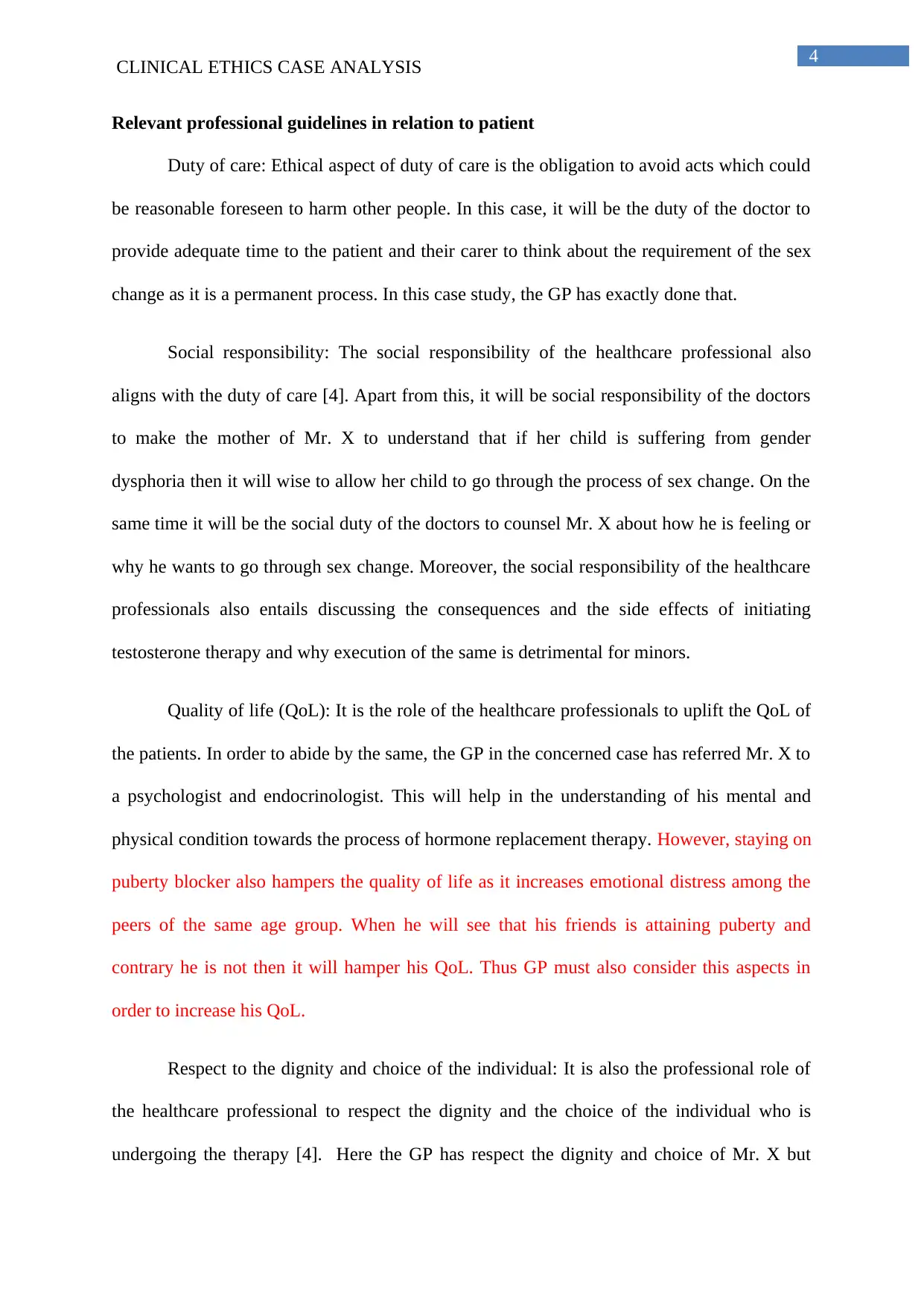
4
CLINICAL ETHICS CASE ANALYSIS
Relevant professional guidelines in relation to patient
Duty of care: Ethical aspect of duty of care is the obligation to avoid acts which could
be reasonable foreseen to harm other people. In this case, it will be the duty of the doctor to
provide adequate time to the patient and their carer to think about the requirement of the sex
change as it is a permanent process. In this case study, the GP has exactly done that.
Social responsibility: The social responsibility of the healthcare professional also
aligns with the duty of care [4]. Apart from this, it will be social responsibility of the doctors
to make the mother of Mr. X to understand that if her child is suffering from gender
dysphoria then it will wise to allow her child to go through the process of sex change. On the
same time it will be the social duty of the doctors to counsel Mr. X about how he is feeling or
why he wants to go through sex change. Moreover, the social responsibility of the healthcare
professionals also entails discussing the consequences and the side effects of initiating
testosterone therapy and why execution of the same is detrimental for minors.
Quality of life (QoL): It is the role of the healthcare professionals to uplift the QoL of
the patients. In order to abide by the same, the GP in the concerned case has referred Mr. X to
a psychologist and endocrinologist. This will help in the understanding of his mental and
physical condition towards the process of hormone replacement therapy. However, staying on
puberty blocker also hampers the quality of life as it increases emotional distress among the
peers of the same age group. When he will see that his friends is attaining puberty and
contrary he is not then it will hamper his QoL. Thus GP must also consider this aspects in
order to increase his QoL.
Respect to the dignity and choice of the individual: It is also the professional role of
the healthcare professional to respect the dignity and the choice of the individual who is
undergoing the therapy [4]. Here the GP has respect the dignity and choice of Mr. X but
CLINICAL ETHICS CASE ANALYSIS
Relevant professional guidelines in relation to patient
Duty of care: Ethical aspect of duty of care is the obligation to avoid acts which could
be reasonable foreseen to harm other people. In this case, it will be the duty of the doctor to
provide adequate time to the patient and their carer to think about the requirement of the sex
change as it is a permanent process. In this case study, the GP has exactly done that.
Social responsibility: The social responsibility of the healthcare professional also
aligns with the duty of care [4]. Apart from this, it will be social responsibility of the doctors
to make the mother of Mr. X to understand that if her child is suffering from gender
dysphoria then it will wise to allow her child to go through the process of sex change. On the
same time it will be the social duty of the doctors to counsel Mr. X about how he is feeling or
why he wants to go through sex change. Moreover, the social responsibility of the healthcare
professionals also entails discussing the consequences and the side effects of initiating
testosterone therapy and why execution of the same is detrimental for minors.
Quality of life (QoL): It is the role of the healthcare professionals to uplift the QoL of
the patients. In order to abide by the same, the GP in the concerned case has referred Mr. X to
a psychologist and endocrinologist. This will help in the understanding of his mental and
physical condition towards the process of hormone replacement therapy. However, staying on
puberty blocker also hampers the quality of life as it increases emotional distress among the
peers of the same age group. When he will see that his friends is attaining puberty and
contrary he is not then it will hamper his QoL. Thus GP must also consider this aspects in
order to increase his QoL.
Respect to the dignity and choice of the individual: It is also the professional role of
the healthcare professional to respect the dignity and the choice of the individual who is
undergoing the therapy [4]. Here the GP has respect the dignity and choice of Mr. X but
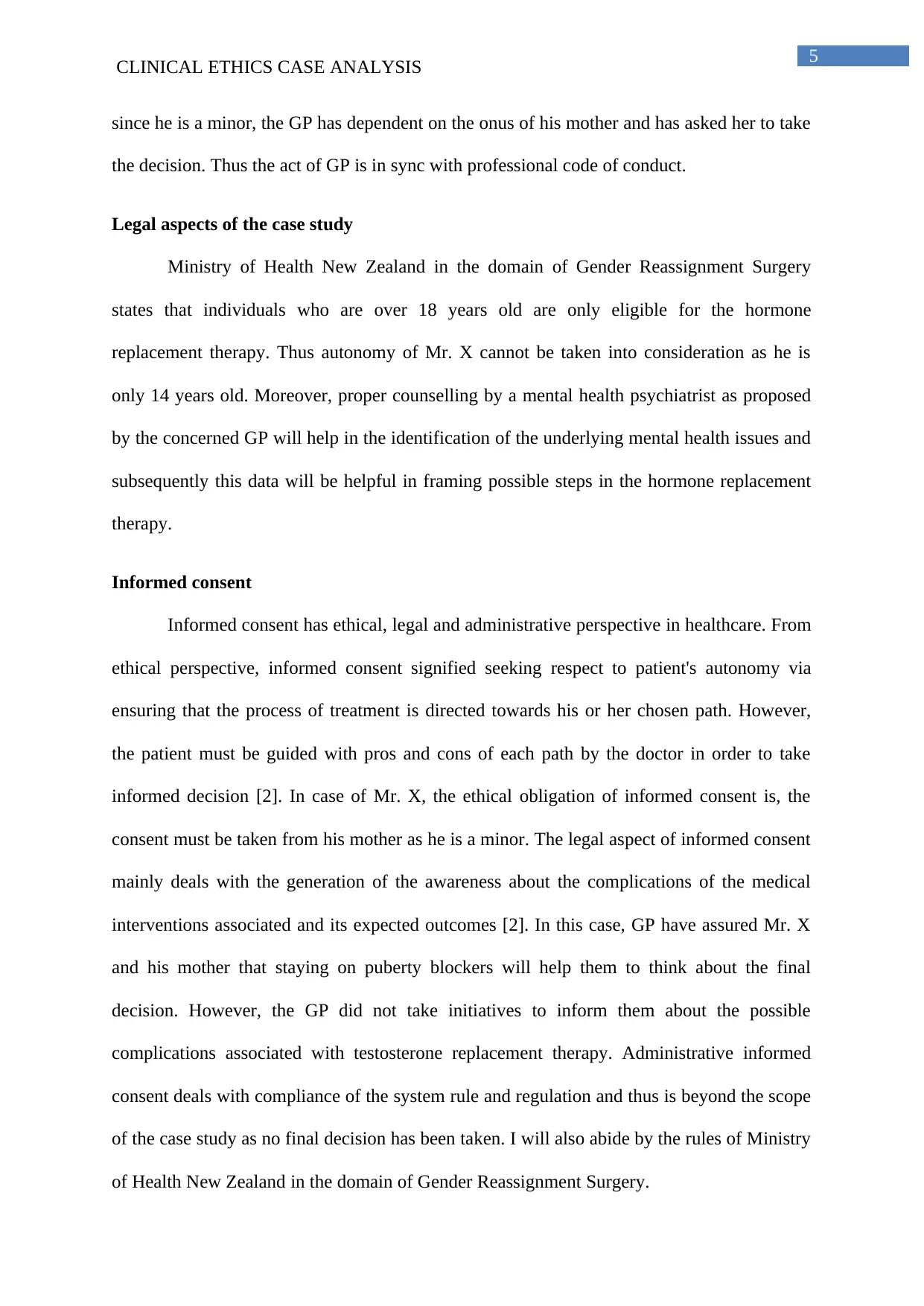
5
CLINICAL ETHICS CASE ANALYSIS
since he is a minor, the GP has dependent on the onus of his mother and has asked her to take
the decision. Thus the act of GP is in sync with professional code of conduct.
Legal aspects of the case study
Ministry of Health New Zealand in the domain of Gender Reassignment Surgery
states that individuals who are over 18 years old are only eligible for the hormone
replacement therapy. Thus autonomy of Mr. X cannot be taken into consideration as he is
only 14 years old. Moreover, proper counselling by a mental health psychiatrist as proposed
by the concerned GP will help in the identification of the underlying mental health issues and
subsequently this data will be helpful in framing possible steps in the hormone replacement
therapy.
Informed consent
Informed consent has ethical, legal and administrative perspective in healthcare. From
ethical perspective, informed consent signified seeking respect to patient's autonomy via
ensuring that the process of treatment is directed towards his or her chosen path. However,
the patient must be guided with pros and cons of each path by the doctor in order to take
informed decision [2]. In case of Mr. X, the ethical obligation of informed consent is, the
consent must be taken from his mother as he is a minor. The legal aspect of informed consent
mainly deals with the generation of the awareness about the complications of the medical
interventions associated and its expected outcomes [2]. In this case, GP have assured Mr. X
and his mother that staying on puberty blockers will help them to think about the final
decision. However, the GP did not take initiatives to inform them about the possible
complications associated with testosterone replacement therapy. Administrative informed
consent deals with compliance of the system rule and regulation and thus is beyond the scope
of the case study as no final decision has been taken. I will also abide by the rules of Ministry
of Health New Zealand in the domain of Gender Reassignment Surgery.
CLINICAL ETHICS CASE ANALYSIS
since he is a minor, the GP has dependent on the onus of his mother and has asked her to take
the decision. Thus the act of GP is in sync with professional code of conduct.
Legal aspects of the case study
Ministry of Health New Zealand in the domain of Gender Reassignment Surgery
states that individuals who are over 18 years old are only eligible for the hormone
replacement therapy. Thus autonomy of Mr. X cannot be taken into consideration as he is
only 14 years old. Moreover, proper counselling by a mental health psychiatrist as proposed
by the concerned GP will help in the identification of the underlying mental health issues and
subsequently this data will be helpful in framing possible steps in the hormone replacement
therapy.
Informed consent
Informed consent has ethical, legal and administrative perspective in healthcare. From
ethical perspective, informed consent signified seeking respect to patient's autonomy via
ensuring that the process of treatment is directed towards his or her chosen path. However,
the patient must be guided with pros and cons of each path by the doctor in order to take
informed decision [2]. In case of Mr. X, the ethical obligation of informed consent is, the
consent must be taken from his mother as he is a minor. The legal aspect of informed consent
mainly deals with the generation of the awareness about the complications of the medical
interventions associated and its expected outcomes [2]. In this case, GP have assured Mr. X
and his mother that staying on puberty blockers will help them to think about the final
decision. However, the GP did not take initiatives to inform them about the possible
complications associated with testosterone replacement therapy. Administrative informed
consent deals with compliance of the system rule and regulation and thus is beyond the scope
of the case study as no final decision has been taken. I will also abide by the rules of Ministry
of Health New Zealand in the domain of Gender Reassignment Surgery.
⊘ This is a preview!⊘
Do you want full access?
Subscribe today to unlock all pages.

Trusted by 1+ million students worldwide
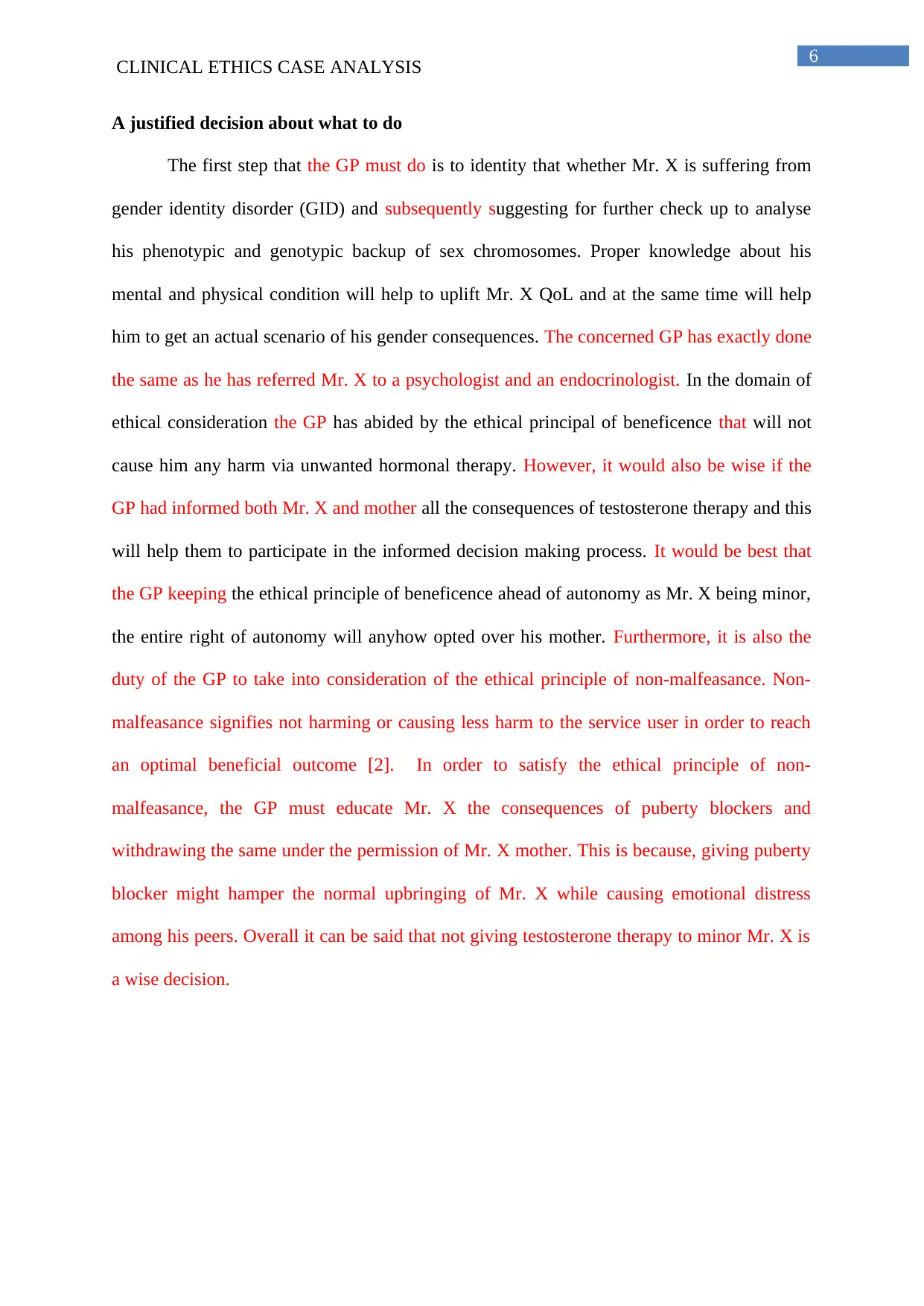
6
CLINICAL ETHICS CASE ANALYSIS
A justified decision about what to do
The first step that the GP must do is to identity that whether Mr. X is suffering from
gender identity disorder (GID) and subsequently suggesting for further check up to analyse
his phenotypic and genotypic backup of sex chromosomes. Proper knowledge about his
mental and physical condition will help to uplift Mr. X QoL and at the same time will help
him to get an actual scenario of his gender consequences. The concerned GP has exactly done
the same as he has referred Mr. X to a psychologist and an endocrinologist. In the domain of
ethical consideration the GP has abided by the ethical principal of beneficence that will not
cause him any harm via unwanted hormonal therapy. However, it would also be wise if the
GP had informed both Mr. X and mother all the consequences of testosterone therapy and this
will help them to participate in the informed decision making process. It would be best that
the GP keeping the ethical principle of beneficence ahead of autonomy as Mr. X being minor,
the entire right of autonomy will anyhow opted over his mother. Furthermore, it is also the
duty of the GP to take into consideration of the ethical principle of non-malfeasance. Non-
malfeasance signifies not harming or causing less harm to the service user in order to reach
an optimal beneficial outcome [2]. In order to satisfy the ethical principle of non-
malfeasance, the GP must educate Mr. X the consequences of puberty blockers and
withdrawing the same under the permission of Mr. X mother. This is because, giving puberty
blocker might hamper the normal upbringing of Mr. X while causing emotional distress
among his peers. Overall it can be said that not giving testosterone therapy to minor Mr. X is
a wise decision.
CLINICAL ETHICS CASE ANALYSIS
A justified decision about what to do
The first step that the GP must do is to identity that whether Mr. X is suffering from
gender identity disorder (GID) and subsequently suggesting for further check up to analyse
his phenotypic and genotypic backup of sex chromosomes. Proper knowledge about his
mental and physical condition will help to uplift Mr. X QoL and at the same time will help
him to get an actual scenario of his gender consequences. The concerned GP has exactly done
the same as he has referred Mr. X to a psychologist and an endocrinologist. In the domain of
ethical consideration the GP has abided by the ethical principal of beneficence that will not
cause him any harm via unwanted hormonal therapy. However, it would also be wise if the
GP had informed both Mr. X and mother all the consequences of testosterone therapy and this
will help them to participate in the informed decision making process. It would be best that
the GP keeping the ethical principle of beneficence ahead of autonomy as Mr. X being minor,
the entire right of autonomy will anyhow opted over his mother. Furthermore, it is also the
duty of the GP to take into consideration of the ethical principle of non-malfeasance. Non-
malfeasance signifies not harming or causing less harm to the service user in order to reach
an optimal beneficial outcome [2]. In order to satisfy the ethical principle of non-
malfeasance, the GP must educate Mr. X the consequences of puberty blockers and
withdrawing the same under the permission of Mr. X mother. This is because, giving puberty
blocker might hamper the normal upbringing of Mr. X while causing emotional distress
among his peers. Overall it can be said that not giving testosterone therapy to minor Mr. X is
a wise decision.
Paraphrase This Document
Need a fresh take? Get an instant paraphrase of this document with our AI Paraphraser
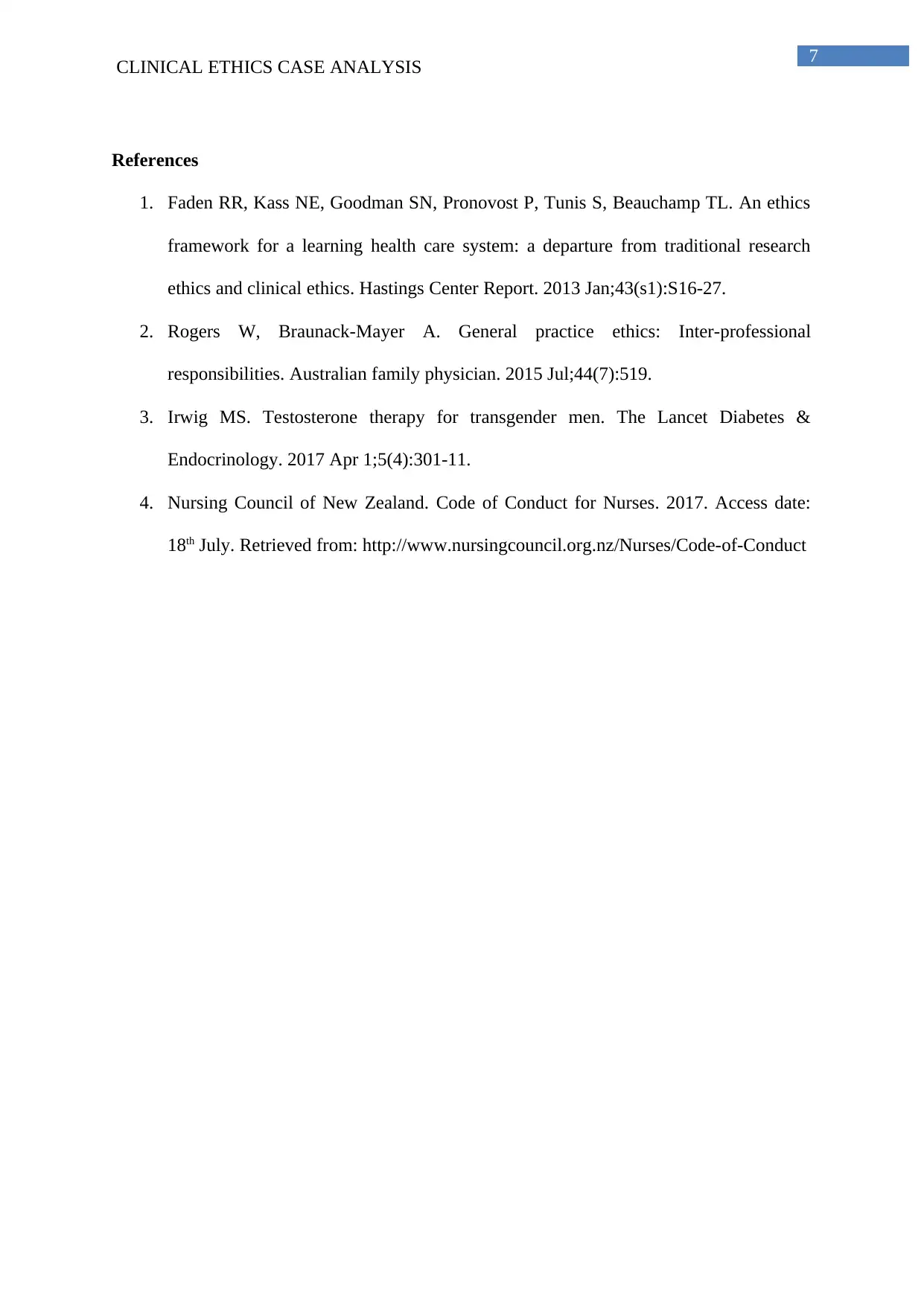
7
CLINICAL ETHICS CASE ANALYSIS
References
1. Faden RR, Kass NE, Goodman SN, Pronovost P, Tunis S, Beauchamp TL. An ethics
framework for a learning health care system: a departure from traditional research
ethics and clinical ethics. Hastings Center Report. 2013 Jan;43(s1):S16-27.
2. Rogers W, Braunack-Mayer A. General practice ethics: Inter-professional
responsibilities. Australian family physician. 2015 Jul;44(7):519.
3. Irwig MS. Testosterone therapy for transgender men. The Lancet Diabetes &
Endocrinology. 2017 Apr 1;5(4):301-11.
4. Nursing Council of New Zealand. Code of Conduct for Nurses. 2017. Access date:
18th July. Retrieved from: http://www.nursingcouncil.org.nz/Nurses/Code-of-Conduct
CLINICAL ETHICS CASE ANALYSIS
References
1. Faden RR, Kass NE, Goodman SN, Pronovost P, Tunis S, Beauchamp TL. An ethics
framework for a learning health care system: a departure from traditional research
ethics and clinical ethics. Hastings Center Report. 2013 Jan;43(s1):S16-27.
2. Rogers W, Braunack-Mayer A. General practice ethics: Inter-professional
responsibilities. Australian family physician. 2015 Jul;44(7):519.
3. Irwig MS. Testosterone therapy for transgender men. The Lancet Diabetes &
Endocrinology. 2017 Apr 1;5(4):301-11.
4. Nursing Council of New Zealand. Code of Conduct for Nurses. 2017. Access date:
18th July. Retrieved from: http://www.nursingcouncil.org.nz/Nurses/Code-of-Conduct
1 out of 8
Related Documents
Your All-in-One AI-Powered Toolkit for Academic Success.
+13062052269
info@desklib.com
Available 24*7 on WhatsApp / Email
![[object Object]](/_next/static/media/star-bottom.7253800d.svg)
Unlock your academic potential
Copyright © 2020–2026 A2Z Services. All Rights Reserved. Developed and managed by ZUCOL.





